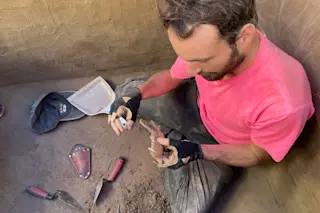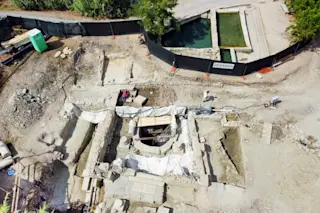It makes sense: stay where it’s warm, sunny, and there’s a lot of food. What, then, were prehistoric people doing on the British seashore? New research published today in Nature pushes human arrival in Britain back to about 800,000 years ago, roughly 100,000 years earlier than our previous estimations. The evidence? A trove of 70 flint tools found on the Happisburgh shore in Norfolk.
Dating artifacts that old isn’t easy (for example, carbon dating doesn’t work), so the researchers had to be thorough. Led by Simon A. Parfitt of The Natural History Museum in London and Nick Ashton of the British Museum, London as part of the Ancient Human Occupation of Britain project, the team used both biological and physical evidence to date the tools. Looking at insect and plant fossils found with the artifacts, researchers determined that the species dated back to the Early Pleistocence period, between 990,000 and ...














